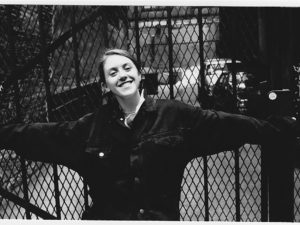By Courtney Devores
The Charlotte Observer, June 25, 2004
Sexy, feminist and lyrically graphic, Liz Phair’s 1993 album “Exile in Guyville” had about as much impact on young women rockers as Nirvana’s “Nevermind” did on the rise of alternative. So when indie-rock’s grand dame released her self-titled fourth album last year following a five-year break, critics and longtime fans wondered how she would… well, fare.
What this dependable purveyor of intelligent, often daring alternative pop-rock released was an excessively produced album containing singles co-written with the Matrix, a trio responsible for Avril Lavigne’s hits. Critics didn’t just wince — they groaned. Had one of the best songwriters of her generation sold her soul for airplay, they asked?
Not quite. Although Phair sacrificed a little underground cred, she’s found a new audience while maintaining plenty of longtime fans willing to wade through the disc’s slick chart-toppers in search of the old Liz.
Phair performs tonight at Kiss 95.1’s Uncle Sam Jam in the parking lot of Dixie’s Tavern — not exactly a hub of adventurous music — along with alt-poppers Fountains of Wayne, the Calling and Josh Kelley.
Phair talked to the Observer Tuesday from her California home about her changing audience, hits, and her image.
Q. Some of the songs on the last album toyed with your image, and you’ve always treated sexuality with a wink. Do you consider what you’re doing now as ironic?
Totally. Part of me has always had this sense of humor. I come from a visual arts background and I’m much more serious about that than I am about music. My early stuff is really playful. “Guyville” is one of the exceptions to that rule. That was a dark period. But music was always a hobby, like a goof-off, a fun thing to do. I’ve (owned) records that were incredibly important to me, that weren’t goof-offs, that were incredibly serious and pivotal and helped me through circumstances. I like to write songs like that, but sometimes I like to write stuff that’s fun, because I spend an equal amount of time blasting what’s on the radio in my car or dancing around the house wildly.
Q. Is that where the last album came in?
I’m a split music consumer, between high- and lowbrow. I don’t look at performers and think they are what they sing. I’ve always felt if you get out and entertain, it’s a front.
Q. Was your mainstream crossover something you’d intended to do all along?
I kept trying. I kept hoping that I’d be able to get on the radio. Now that I’ve accomplished that, I wonder if I’ll continue to feel as motivated to do that.
Q. Do you think the old fans that read about you working with the Matrix didn’t even listen to the album?
I don’t think they did. I’m pretty sure that they kind of smelled that wind and thought, “No, no, not for me.” I think they almost turned their backs on it out of principle alone. If they listened to the whole record, and certainly the EP that was attached to it, they would have heard my life-long songwriting style. (To many critics), I’m just a political artist… It’s not just about the music, it’s about what decision did I make? I didn’t expect that. I figured I was a mom of seven years. I was way, way out of indie in terms of lifestyle, so (the reaction) was a surprise to me. But it wasn’t a bad thing. All that attention and furor, although it was negative, made it an important record to take a stand on.
Q. What was it like going back on tour in the midst of alienating your core fans?
I got out there after being gone for five years and realized how far my audience had dwindled. I was, like, “Wow, I used to be able to sell out places like this.” I realized I had a lot of work ahead of me to get my fan-base back up.
Q. Have you noticed a change in the audience?
We were really nervous with all of the bad reviews. At first it was like a wedding with the bride and groom sides. There’d be 9- to 15-year-old girls on one side and gray-haired geezers on the other. An old song would be playing and the old guys would be “Yeah!” Then “Why Can’t I?” or “Extraordinary” would come on and the girls would be singing and holding up their cell phones. Slowly over the year, a lot of other people filled in the gaps until it was all the way from 9 to 40-somethings.
Q. As the mother of a 7-year-old son and as an artist, what’s your opinion on the trend in the entertainment industry that pop stars are younger and younger?
I worry, will their art develop? I’m sure it will in some ways, but I miss the idea that an artist can have a career trajectory that reflects their vision rather than the industry’s demands.
Q. You’re heading out in August on the all-female Chicks With Attitude Tour. You like performing with other women?
I’m a nostalgic freak for Lilith Fair. It was a turning point in my career — the first time that I saw a model I wanted to emulate. I’d come up in rock and it was so male-dominated. Lilith Fair was the opposite of that. I hope to recapture some of that feeling.






